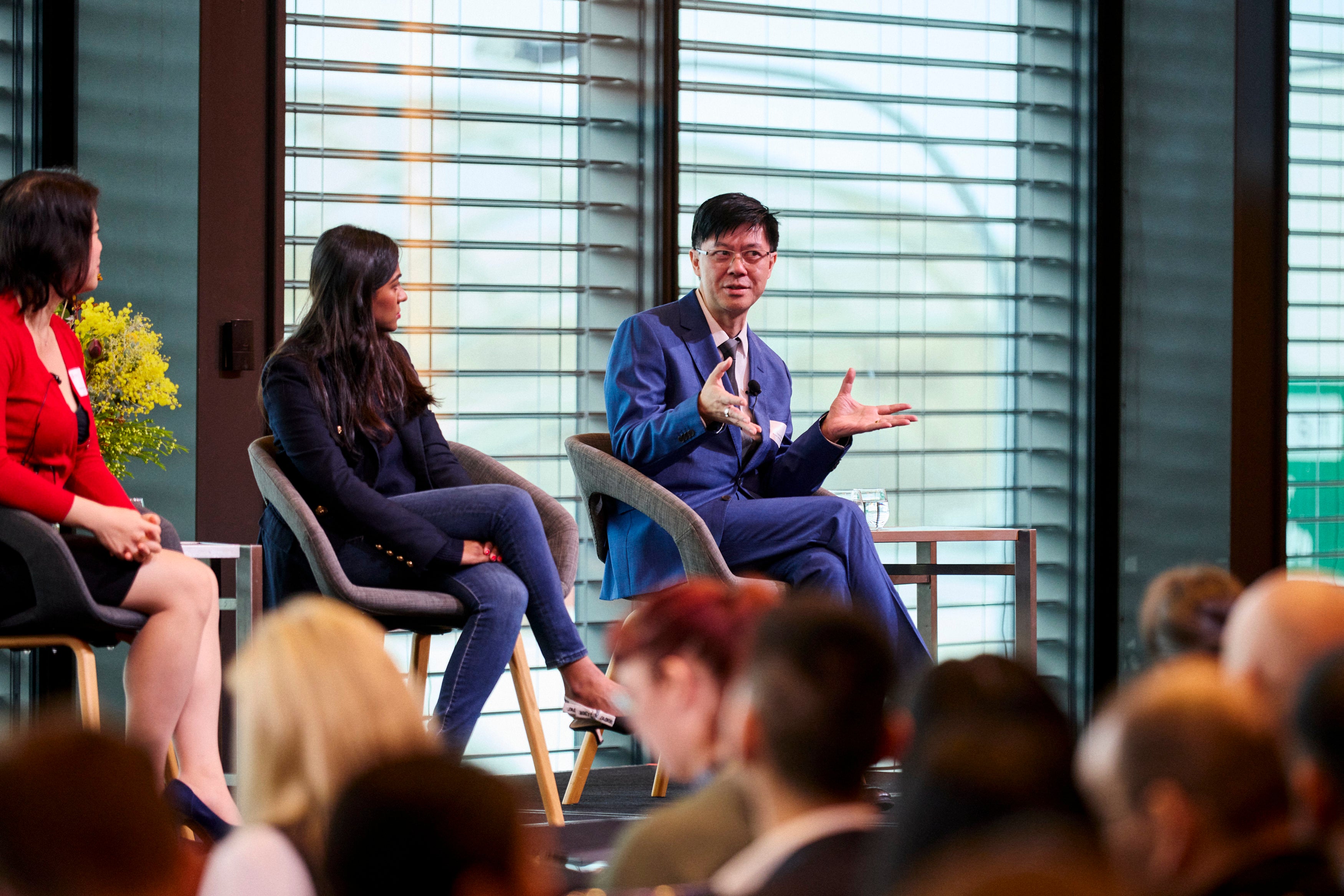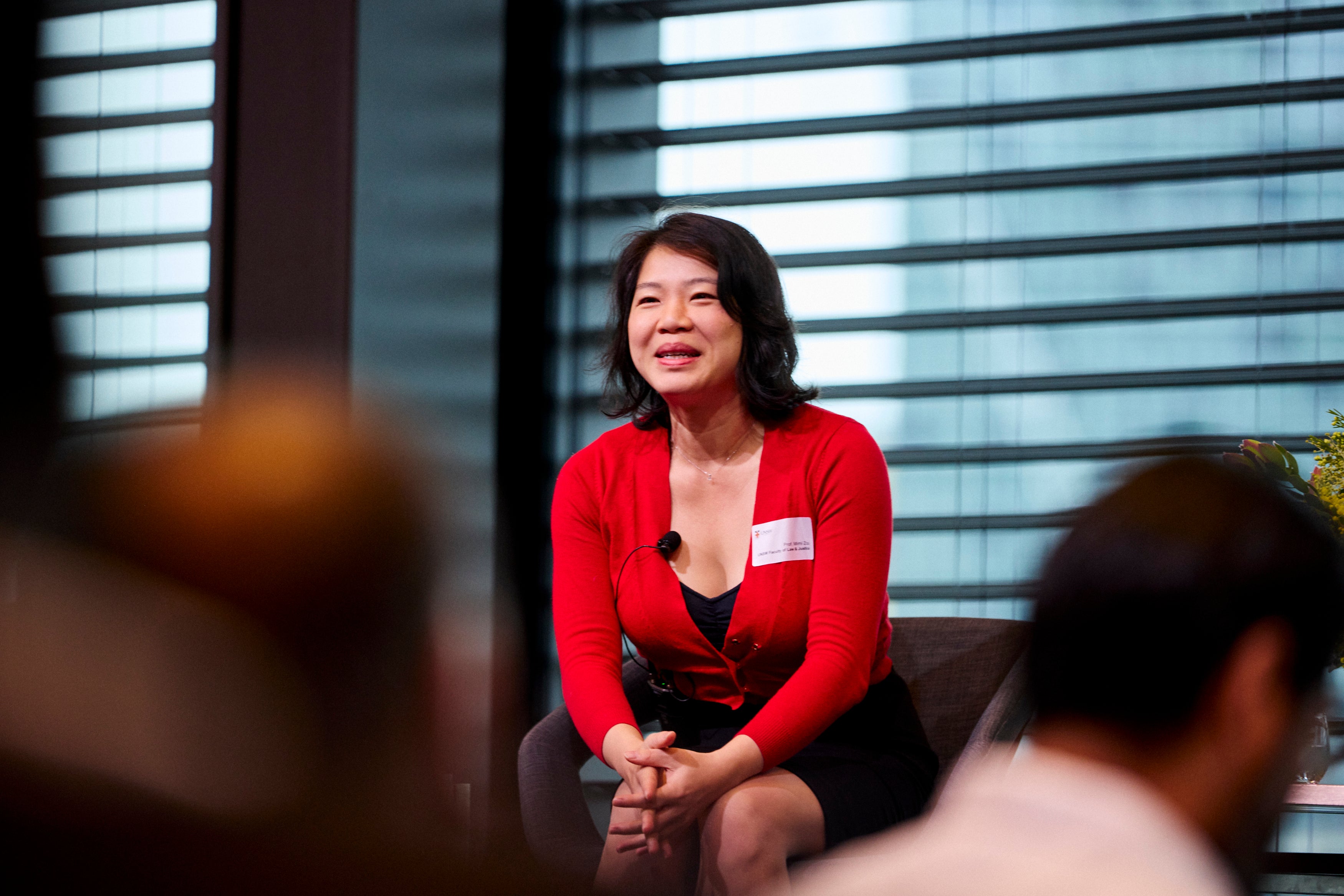Approaching AI maturity as a team sport
Successful AI adoption depends on trust, multidisciplinary teamwork, and leadership that values judgement over technical expertise
AI success isn’t achieved by isolated tech teams. It isn’t just a question of the right tools, or even expertise. It’s about cultural intelligence, curiosity, and the courage to build something new together. That was the message from the AGSM 2025 Professional Forum panel, where three experts shared what it will take to embed artificial intelligence in organisations.
Too often, leaders look for a grand strategy that will deliver results quickly. But as Edward Wong, Head of Strategy at 4mation Technologies explained, the most effective transformations start closer to the ground.
“We worked with a 40-person construction firm that asked every team member to look at their day-to-day work and suggest tasks they thought AI could help with,” Mr Wong recalled.
The result? A list of over 100 ideas – many of them simple, practical improvements like using AI to triage email queries. By empowering employees to shape change, the business created a sense of ownership and momentum. “Start small and let adoption evolve from the people who understand the work best,” Mr Wong advised. “It doesn’t have to be perfect. You just have to begin.”
Multidisciplinary ‘crews’ – not silos – get it done
For Dhivyaa Thayalan, AI Products and Partnerships Lead at Commonwealth Bank of Australia (CBA), this collaborative ethos has been essential. She described CBA’s innovative approach to artificial intelligence, emphasising its integration as a collaborative capability within cross-functional teams, referred to as ‘crews’.
“At CBA, our AI initiatives are driven by diverse crews that include business experts, engineers, data scientists, and various specialists,” she explained. “Our primary objective is to leverage AI to enrich the customer experience in impactful and meaningful ways.”
This approach extends to learning, too. CBA’s internal AI education series achieved unprecedented engagement levels – proof that people are hungry to build their confidence and skills in AI, when given the opportunity.

Other panellists agreed: when AI sits in a silo, results suffer. Mr Wong shared a cautionary example of an organisation that tried to tackle a digital transformation and an AI rollout in parallel. “They basically bit off more than they could chew,” he said. Lacking a clear roadmap and coordination, both initiatives stalled.
And the lesson Mr Wong took from this was clear: when teams don’t talk and strategies don’t align, innovation becomes chaos. AI success demands coordination across purpose, process and people.
Leading with questions, not answers
Many leaders believe they need all the technical answers to successfully lead AI integration. But all three experts argued that the most critical leadership skill in the age of AI isn’t coding ability – it’s judgement.
“Judgement is a skill set that’s undervalued,” Ms Thayalan observed. “It’s important to critically evaluate the solution for the problem that we are solving.
Mr Wong echoed this sentiment, noting that leaders must be prepared to ask smart questions, challenge assumptions – and create an environment where experimentation is safe, even expected.

Professor Mimi Zou, Head of School of Private & Commercial Law at UNSW, agreed that leaders don’t need to be engineers but must understand the ethical, legal and operational considerations AI introduces.
“It’s really important to have at least a basic understanding of the risks and responsibilities,” she said. “You don’t need a master’s degree in AI, but you do need to know enough to ask the right questions and exercise critical thinking.”
From tech-first to trust-first
While embracing AI can sometimes feel like a race to adopt the latest model or automate every process, the panel cautioned against novelty for novelty’s sake.
“Sometimes there’s this pressure that everyone’s using AI, so you need to be seen to be using it too,” Prof. Zou said. “But you really need a clear idea of what outcomes you’re trying to achieve.”
Subscribe to BusinessThink for the latest research, analysis and insights from UNSW Business School
This helps foster trust, which the panellists stressed must be built into AI systems from the start. Although regulations are evolving, legislation alone doesn’t guarantee ethical outcomes. Prof. Zou highlighted the case of a recruitment AI tool at Amazon that inadvertently discriminated against women applicants, risking major reputational damage.
“This is why transparency, explainability and safeguards are so important,” she said. “Trust can’t be an afterthought. It has to be designed in.”
A new vision of work
AI will change the nature of work, but it doesn’t mean eliminating humans altogether. Rather, it offers a chance to eliminate drudgery.
Mr Wong suggested that, by automating low-value tasks, organisations can free people to focus on more meaningful, creative contributions.

Still, structural change is inevitable. Prof. Zou challenged professional services firms to reconsider traditional business models, like billable hours, which may not align with AI’s ability to complete certain tasks in minutes rather than days.
“It can feel uncomfortable,” she acknowledged. “But this is why leaders need to be proactive about reimagining where value comes from and how people’s skills are best used.”
Take the first step
So, how should leaders prepare themselves – and their organisations – to thrive?
“The best way to get ready is to start,” Ms Thayalan urged. “Play around with the tools. Experiment safely. Treat it like a teammate. Ask it questions. Challenge it. Refine your prompts if you don’t get the output you want. Ask about its assumptions – how did you come up with that? Once you get an output that matches your expectations, reflect on the prompts that got you there. That’s how you build your AI prompting proficiency.”
Learn more: AI won't take your job (yet): Insights from OpenAI's Chief Economist
Ms Thayalan also encouraged leaders to explore different models and learn which ones fit best for different needs. “You’ll find some models are better for technical reports, others are better for creative tasks,” she added.
Prof. Zou closed the discussion with a reminder that intentionality matters as much as curiosity. “Be clear about why you’re using AI,” she said. “Make sure it’s tied to real outcomes for your organisation. That’s how you build capability that lasts.”
AI maturity doesn’t happen by decree or accident. It happens when leaders make space for trust, collaboration and the hard, human work of learning together.
